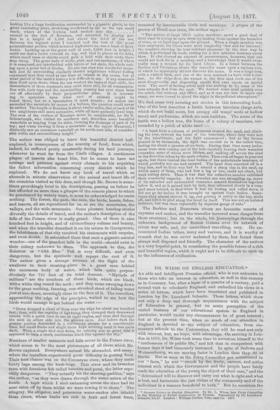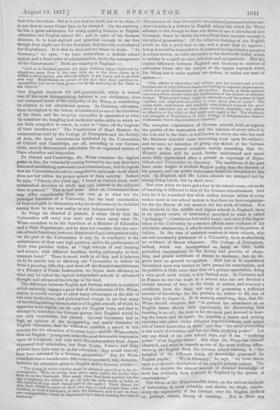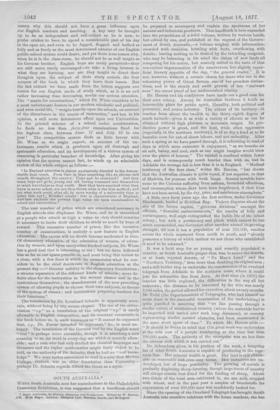DR. WIESE ON ENGLISH EDUCATION.*
Art able and intelligent Prussian official, who is not unknown to those who take an interest in education, as well in this country as in Germany, has, after a lapse of a quarter of a century, paid a second visit to scholastic England, and embodied his views in a series of letters, which have been translated and published in London by Dr. Leonhard Schmitz. These letters, which show not only a deep and thorough acquaintance with the subject of Education in general, but an acute perception of the varied features of our educational system in England in particular, would under any circumstances be of great interest ; but at the present time, when so much of our attention in England is devoted to the subject of education, from ele- mentary schools to the Universities, they will be read not only with interest, but, we hope, with advantage. On arriving in Lon- don in 1876, Dr. Wiese took some time to accustom himself to the "restlessness of its public life," and felt that in comparison with former days it had immensely increased. In spite of Sadowa and Weissembourg, we are moving faster in London than they do at Berlin. But as soon as the Privy Councillor got accustomed to our " faces," he was "‘ struck by the lively, earnest, and active interest with which the Government and the people have lately made the education of the young the object of their care," and the " determined will to discover and carry out what is right and what is best, and harmonise the just claims of the community and of the individual in a manner beneficial to both." But he considers the " Gorman Letters on English Education. By Dr. L. Wiese, late Privy Councillor in the Ministry of Public Instruction in Prussia. Translated by Dr. Leonhard Schmitz, LL.D. London : William Collies, Sons, and Co. 1877.
'task to be herculean. But it is not that so much has to be done, it is not that so many things have to be changed. On the contrary, 'he has a great admiration for many existing features in English education and English school life ; and in spite of his German theories, he is keen-sighted and practical enough to see that though they might not do for Germans, they are very well adapted for Englishmen. It is that he does not see where to begin. "In Germany," he says, " we have everywhere a definite school 'system and a fixed order of administration, under the management of the Government." Both are wanting in England :-
"Just as in England parents let their children follow their own in- olinations more than is the case with us, so the State there, up to within a short period, also allowed schools to act fa ooly and to go their own way. Englishmen are proud of the fact that their parental re- sponsibility has never boon given over to the authority of the State or the Church."
Our English fondness for self-government, which is indeed one of the most distinguishing features in our civilisation, does not command much of the sympathy of Dr. Wiese, in considering its relation to our educational system. In Germany, education, from the highest to the lowest, is considered as one of the functions of the State, and the ex-privy councillor is astonished at what 'he considers the bungling and inefficient make-shifts to which we .are daily compelled to resort, in order to " stave off the bugbeai of State interference." The Conferences of Head Masters, the examinations held by the College of Preceptors and the Society of Arts, the local examinations instituted by the Universities of Oxford and Cambridge, are all, according to our German critic, merely disconnected substitutes for an organised system of State education and inspection.
To Oxford and Cambridge, Dr. Wiese considers the highest praise is due, for voluntarily coming forward in the way they have done and establishing systematic local examinations ; but he regrets that the Universities should be compelled to undertake work which does not fall within the proper sphere of their activity. Indeed he says, "Twenty-five years ago, 1 found at Oxford much more undisturbed devotion to study and real interest in the subjects than at present." This is bad news. After all, Continental ideas
may differ considerably from our own as to what are the principal functions of a University, but the local examination
of boys and girls in elementary subjects would scarcely be included among them by any new nation or any independent thinker.
As things are situated at present, it seems likely that the Universities will every year more and more usurp what Dr. Wiese considers to be the functions of a Minister of Education and a State Department ; and he does not consider that the exer- cise of such functions, however disinterested and even praiseworthy on the part of the Universities it may be, is conducive to the maintenance of their own high position, and to the performance of -their own peculiar duties, as " high schools of real learning and science, with different faculties, having philosophy as their
common bond." There is much truth in all this, and it behoves us to be careful lest in allowing our Universities to relieve us from a pressing difficulty, and stave off the dreaded establishment of a Ministry of Public Inetruction, we injure their efficiency as what may be called the highest independent schools of advanced thought and advanced knowledge in the land.
The difference between English and German schools is a subject which naturally engages a good deal of the attention of Dr. Wiese, and he is candid enough to allow many advantages on the side of our own institutions, and philosophical enough to see that many of the distinguishing characteristics of English schools, of which he approves most highly, are fit 'only for English boys, and that to attempt to introduce the German system into England would be not only undesirable, but absurd. General Gneisenau had so high an opinion of the invigorating and manly character of English education, that he wished to establish a school in this country for the education of German boys ; and Dr. Wiese admits that our English "young men make the most favourable impression upon all foreigners ; not only have the ambassadors from Japan expressed their admiration, but from Persia, France, and Italy princes have been sent to us for education ; they would scarcely have been entrusted to a German gymnasium," But Dr. Wiese
considers that a considerable difference is necessary, nay, desirable, between the education given to English and to German youths :— " The young in every country must be educated according to its cir- cumstances. With us, young men enter upon public life earlier than 'they do on the Continent. how many, when they have scarcely left the age of boyhood, aro obliged to go out into the wide world, to India, to the colonies, or any other distant part of the earth I Their fitness for this, their ability to stand on their own legs, to look around them with freedom, to form a resolution, to take the initiative' and to act on their own responsibility, would be diminished by a school training like that of Germany." The umouti t of time devoted to the national games and active out- door exercise is a feature in English school life which Dr. Wiese admires in sittl, though he does not desire to see it introduced into Germany, where be thinks the sch oolboys have exercise enough in the school gymnasium ! Of the religious traiuing of the English youth he has a good deal to say, and a great deal to approve ; but as it would be impossible to do justice to so important a question in a brief review, we refer the reader to his thirteenth letter, which is written in a spirit at once judicious and sympathetic. But the
capital difference between England and Germany in matters of education forms also the subject of the capital reproach which Dr. Wiese has to make against our system, or rather our want of system :—
" The affairs of education and culture, and the science and art col- lections, are in very different hands, and belong to separate departments, which are quite independent of one another. Hence, in these matters, one everywhere misses unity and combination of the powers of adminis- tration. What grand things might he attained, could the means be kept together and employed according to some fixed plan of unity 1 The many noble endeavours and unselfish contributions towards the great object of education are as they stand—isolated, atomistic —not nearly AO OffOOtiVO to the whole as they might and ought to be. The obstinacy and strength of Englishmen in their feeling of independence become weaknesses whore organisation is required."
The complete organisation of German schools, both as regards the quality of the instruction and the relation of every school to the rest and to the State, is well known to every one who has read Mr. Matthew Arnold's most interesting work upon the subject ; and we have no intention of giving any sketch of the German system on the present occasion, merely remarking that Dr. Wiese's letters will be much better understood and much more fully appreciated after a perusal or reperusal of Higher Schools and Universities in Germany. The traditions of the past have more weight in modern English polity than the theories of the present, and our public instruction forms no exception to this rule. In England, said Mr. Lowe, schools are managed not by strong living hands, but by dead ones !
But even when we have got a boy in the school-room, our mode of teaching is different to that of the German schoolmasters. And here let it be remarked that what strikes foreign critics of every nation most in our school system is that there we have no guaran- tee for the fitness of our masters for the work of tuition. For the teachers in the middle and higher schools in England, there is no special course of instruction provided in what is called "pedagogy "—a barbarous but useful word—and even if the degree taken at the University by a teacher affords some evidence of his scholastic attainments, it affords absolutely none of his powers of tuition. In the case of assistant-masters in many schools, who are not necessarily graduates of a University, there is absolutely no evidence of fitness whatever. The College of Preceptors, indeed, which was incorporated as lately as 1849, holds periodical examinations in the theory and practice of educa- tion, and grants certificate of fitness to teachers ; but its de- grees have no general recognition. Still less is it considered incumbent upon any teacher to have passed its examination, and its position is little more than that of a private association, doing a very good work within a very limited area. In Germany and in France no one can teach in a school who has not devoted a certain amount of time to the study of tuition, and received a certificate from the State not only of possessing a sufficient amount of knowledge for the position he wishes to fill, but of being able to impart it. It is scarcely surprising, then, that Dr. Wiese should complain that "in general the attendance at an English lesson affords little opportunity for discovering that teaching is an art ; the hour is for the most part devoted to hear- ing the lesson said by heart; the learning a lesson and writing exercises take place under different superintendents, and rather out of lesson-hours than in them," and that " the usual proceeding is too much of a routine, and has too little vivifying power." Let any one think of his own school days, and of the " vivifying power" of an English lesson ! But what Dr, Wiese has himself observed, and what he regards as one of the most striking differ- ences in the English from the German school-training, is " the isolation of the different kinds of knowledge possessed by English pupils." " We in Germany," he says, "lay more stress upon a progressive development of the pupil's general culture. The desire to acquire the utmost amount of detailed knowledge of facts has evidently been fostered in England by the system of examinations."
The whole of Dr. Wiese's twelfth letter, on the various methods of instruction, is most valuable, and shows, we' think, conclu- sively the superiority of the German over the English method or, perhaps rather, theory of teaching. Nor is there any
reason why this should not have a great influence upon our English teachers and teaching. A boy may be brought up to be as independent and self-reliant as he is now, to prefer cricket to beer, to spend a considerable part of his day in the open air, and even to be fagged, flogged, and bullied as fully and as freely as the most determined admirer of our English public-school system could desire, and yet there is no reason why, when he is in the class-room, he should not be as well taught as his German brother. English boys are rarely permitted—they are still more rarely encouraged—to take a living interest in what they are learning, nor are they taught to direct their thoughts upon the subject of their study outside the four corners of the book in which they learn their lesson. But the last extract we have made from the letters suggests one reason for our English mode of study which, as it is an evil rather increasing than decreasing, merits our serious attention. The " mania for examinations," which Dr. Wiese considers to be a most unfortunate feature in our modern scholastic and political, and even social life, " weighs heavily upon the schools, on account of the disturbance in the course of instruction," and has, in his opinion, a still more deleterious effect upon our Universities. In the printed scheme of a school under consideration, he finds no less than forth four examinations fixed for the highest class, between June 17 and July 22 in one
year The competitive system finds as little favour with Dr. Wiese as we might expect, on account of the un- fortunate results which it produces upon all thorough and systematic education, and its development of a vicious system of cramming in particular branches of knowledge. After giving his opinion that the system cannot last, he winds up an admirable review of the whole subject as follows :—
" In England attention is almost exclusively directed to the demon- strable final result. From time to time something like an alarum- bell sounds throughout the country : Come and be examined! And they come, boys and gills, young and old, having crammed into themselves as much knowledge as they could. How they have acquired what they know is never asked, nor are they shown what is the best method; and yet what work could, after all, be mere worthy of a university than to point this out?, Results! results ! this is characteristic of England, and best explains the present high value set upon examinations in school and universities."
The vast number of prizes which are considered necessary in English schools also displeases Dr. Wiese, and he is astonished at a people who attach so high a value to duty should consider it necessary to incite their children to study so much by hope of reward. This excessive number of prizes, like the excessive number of examinations, is entirely a new feature in English education. The excess will no doubt become moderated in time. Of elementary education, of the education of women, of educa- tion by women, and upon many other kindred subjects, Dr. Wiese has a good deal that is interesting to say ; but we have followed him as far as our space permits us, and must bring this review to a close, with a few lines in which he enumerates what he con- siders to be the chief desiderata in English education at the present day :—" Greater solidity in the elementary foundations ; a stricter separation of the different kinds of schools ; more de- finite aims for the instruction in the several classes and in the institutions themselves ; the abandonment of the now prevailing system of allowing pupils to choose their own subjects, in favour of the system of classes ; and institutions preparing teachers for their functions."
The translation by Dr. Leonhard Schmitz is apparently accu- rate, without being by any means elegant. The use of the abbre- viation "e.g." as a translation of the original "e.g." is rarely allowable in English composition, and its constant recurrenhe in the book before us, i❑ such sentences as " It cannot be supposed that, e.g., Dr. Farrar intended to represent," &e., is most un- happy. The translation of the German real by the English word " real " is perhaps more excusable, though it is attaching a new meaning to an old word in every-day use which is scarcely allow- able ; and a man who had only studied the classical languages and literature and the higher mathematics might fairly object to be told, on the authority of Dr. Schmitz, that he had no "real know- ledge." We were rather astonished to read in a note that Merton College, Oxford, was an older foundation than University— perhaps Dr. Schmitz regards Alfred the Great as a myth.




































 Previous page
Previous page